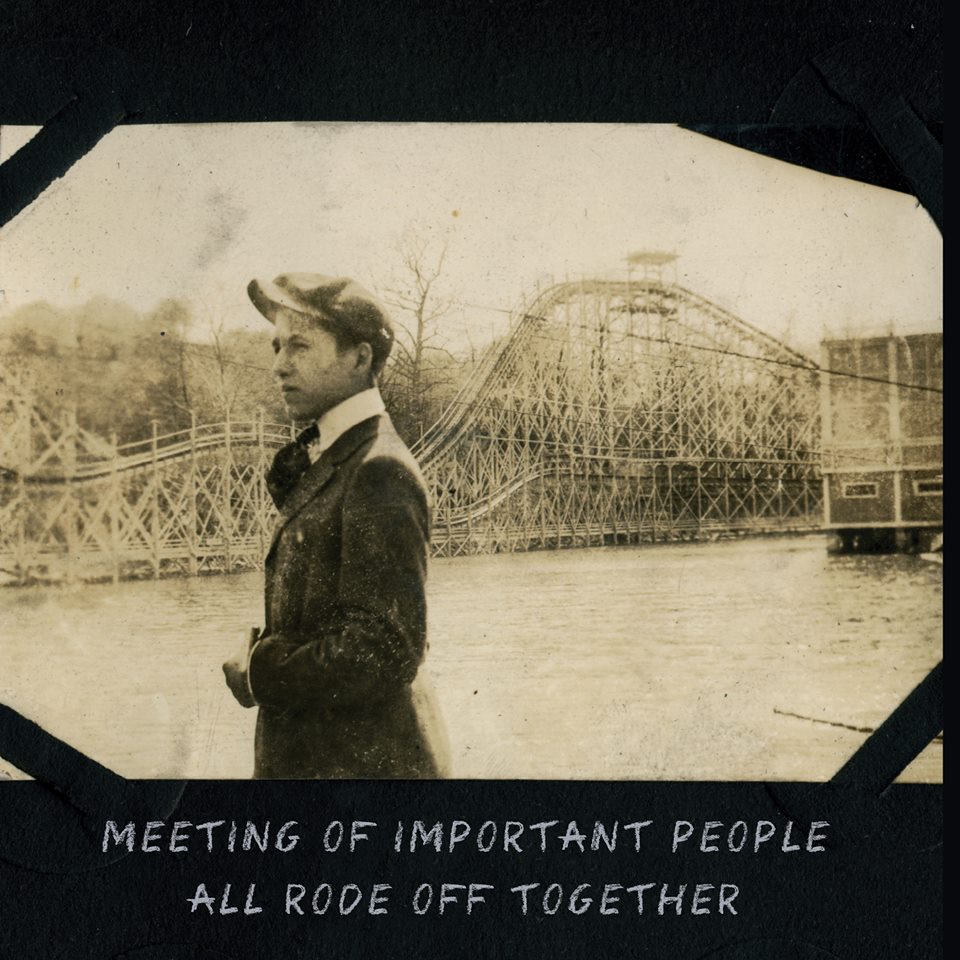By Julian Routh | Editor-in-Chief

(left to right) Aaron Bubenheim, Josh Verbanets and Matt Miller make up Meeting of Important People, a band that has gained a large following in Pittsburgh. They released their new album, “Troika,” in February.
In the decade since they started playing music together, the three guys in local garage rock band Meeting of Important People have watched each other grow personally and musically.
Their new album, “Troika,” is a product of that growth; an immaculately full collection of songs that sounds more polished than their three previous records.
And that’s not all for MOIP’s Josh Verbanets, Aaron Bubenheim and Matt Miller. They are opening up for Delicious Pastries this Friday at Spirit in Lawrenceville and are playing big hometown shows in April, May and June. For more information on shows or how to download the new album, go to www.meetingofimportantpeople.com.
I recently sat down with Verbanets, lead vocalist and guitarist, to talk about the new album and what’s next for the band.
JR: The thing about “Troika,” to me, is that it borrows elements from each of MOIP’s previous three albums and improves on them. Is this something you guys were going for, to keep evolving while also staying true to your sound?
Verbanets: What you said is absolutely the right case. Going into the recording process with Jake Hanner from Donora, the idea for this one was to take the best elements of our older records and at the same time take a big step forward. Our first album had that youthful imagination to it, and we tried to highlight that in the new one. “Quit Music” was a rough, raw live sounding recording. The third album in 2012, that was a groove album with textures, harmonies and shakers. We tried to take those three big elements and accentuate the things that worked, and also take a big step forward with lyrical themes and everybody in the band contributing equally. It was a great collaboration.
JR: The songs on this album seem a bit deeper and more reflective than some of MOIP’s songs in the past. In what way did you approach the album differently from a songwriting perspective?
Verbanets: Our older songs were a lot of times lyrically, uh, they really didn’t make sense to anybody but me. They were usually little vocal hooks I’d come up with and sometimes they didn’t have a literal meaning. They were good sounding phrases put together that meant things to other people, but I wasn’t trying to specifically communicate a theme. Because of my work with Josh and Gab, I found there’s a great reward when you can communicate to people. It’s really nice when other people can take something from our songs, too. That’s not to say I’m trying to be less weird or edgy. But if we’re going to be weird or edgy, we might as well still communicate, or what’s the point, you know?
JR: Well if that’s the case, what meaning or message are you trying to get across with “Troika?”
Verbanets: We’re trying to get everybody to vote Trump. Just kidding. It’s supposed to be a little more broad. The first song on the album is an intro song, and some of my favorite albums have great intro tracks. Alice Cooper in the ’70s, “Hello Hooray,” it’s the greatest introductory song I’ve ever heard. The next couple songs are supposed to be broader, not just about specific things that happened to me or what I’m feeling, but observations of what’s going on on planet Earth. The second song, “Take Action!” is a fake political song. The third, “For the Masses,” is a list of things that will probably never happen for you, but in a good way. The whole album was written in a short period of time. The previous albums had songs on them that were written when I was a kid. This was the first time where the album is literally a snapshot of everything that has happened in the last two years with us. It’s the first time we have a nice focused album in that way.
JR: So it’s not one of those retro-style concept albums, but a collection of broader themes that MOIP has never really experimented with before?
Verbanets: Exactly. The concept, I think, was Emo. You know, late ’90s, mid 2000s, it was all guys singing like, “why won’t you go out with me?” The idea for this album was to sing much more emotional. We were going to call the album “Emo,” but we thought maybe it would turn off some people. Conceptually, it is much more emotional, anthemic and communicative stuff than we’ve ever done. It’s a little less tongue in cheek, a little less silly and a little less irreverent.
JR: The album has a vintage roller coaster picture on it, has that retro feel to it, and so does the name itself. Where did the name “Troika” come from?
Verbanets: In the ’80s, at Cedar Point, they had a ride called the Troika. It was a spinning ride with three cars. I thought “Troika” was such a cool phrase, I learned later it is a Russian, eastern European term that means a political alliance of three countries. We realized that there’s three guys in this band, of eastern European descent, that it has that feel of a political alliance. And the album, it’s a ride.
JR: I think a big part of why people are drawn to your music is the live performance. How do these songs translate on stage?
Verbanets: Well, about half of the album, we’ve been playing live now for two or three years. “Fifty Bucks,” “Tell Me It’s Not Too Late,” “All Rode off Together,” “Don’t Wait up for Me.” Those are some of our best live songs. The other half of the album, we wrote over the fall to finish the album. Those ones incorporate a lot of strings and a lot of horns, even a violin. It’s the first time we’ve ever incorporated horns, strings and stuff into our music. And people are responding really, really well to it. It’s just the way I had imagined. In the past, we didn’t even know any trumpet players or string players.
JR: So what’s next for you guys?
Verbanets: We put this album out because it’s the right time to do it. Pittsburgh has never received so much attention creatively. With our past albums, we wanted to get famous. We literally don’t want to do that anymore. We love our lives here. Our band never took off nationally, but it really did take off around here. It’s been just the most fulfilling thing. For the band as a whole, we wanted to continue the story of what we’re doing creatively as three guys who have been playing together for 10 years. The whole idea is just to continue to build and foster this community around here. And I’m paying my mortgage doing it. It’s about as close to my dreams as I could ever imagine.
JR: Before you’re off the hook, give me a fun fact about the album that no one else knows.
Verbanets: The third song on the album, “For the Masses,” I wrote that to be like a Lorde song. I imagined Lorde doing it. I would do anything in the world to give Lorde that song. I think she’s absolutely a true talent, incredibly unrefined and refined at the same time. It’s the kind of song I imagine her doing, trip hop beat in the background with her giving you her poetic knowledge.



